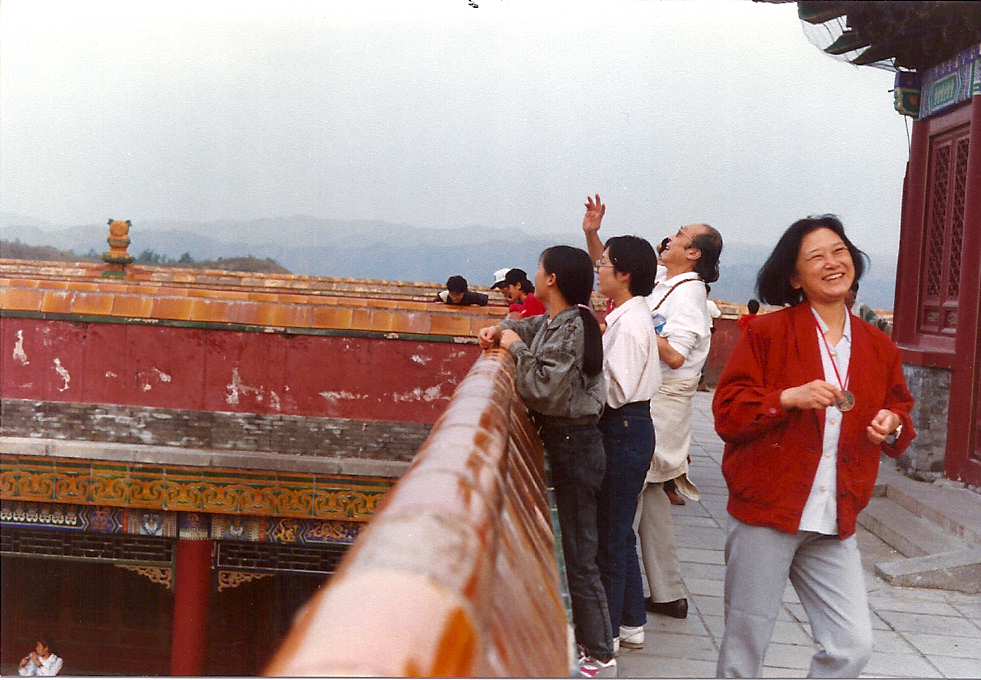
I fell in love with Beijing when I was sixteen. It was the mid-'90s. Michael Jackson was still the pop star du jour; McDonald's was an upscale experience replete with clean tables and even cleaner toilets. Internet service and cell phones were nearly non-existent.
Those days, you understood the city by two forms of transit: bicycle and foot. You seldom took a taxi and if you did, it was the 'mianbao' (or 'breadbox') van, so named for its shape, which lacked seats and a meter. To American teenagers, like the ones I knew through my high school study abroad program, Beijing still felt like the Wild West with its unregulated taxis, narrow streets filled with donkey carts dragging apples and cabbage from the suburban farmland (since ploughed over to build row upon row of apartment blocks), and nightlife which consisted only of small Chinese discotheques, the tinseled row of bars hawking their happy hour specials on Sanlitun.
The Beijing I knew and loved had pollution, sure, but it was of the type that belonged to a nation slowly shrugging off the cloak of Communism: coal smoke plumed above one-story hutong neighborhoods, alleyway windows billowed steam from busy restaurant kitchens. Of course, when we bicycled around the Third Ring Road (back then, the now traffic-clogged Fourth Ring was but a dream -- currently, six rings encircle the ballooning city), we returned to our Beijing homestays with 'black boogers' as we lovingly called them. We'd blow our noses and compete to see whose mucus was the darkest.
But the skies were, as far as I remember, nearly always a bright, clear blue. Because there were more bicycles than automobiles (there are now more than five million cars on Beijing's streets), the air was only redolent of burning coal, not the now-noxious combination of car exhaust and construction and nearby factory fumes.
In light of recent media reports about the staggering pollution levels in Beijing this week, which have reached unprecedented 'hazardous' levels, I felt I needed to return to the Beijing I once believed in. I looked to an old Beijing native for comfort: author Wang Shuo, a prolific Chinese writer often glanced over in favor of the more esteemed likes of Mo Yan and Gao Xingjian.
In Playing for Thrills (published in 1989 and translated into English in 1997), Wang describes a Beijing just like the one I remember. He writes:
It was just past noon, and sunlight washed the lanes like water spilling out of a trough, the glittery rays penetrating the surrounding haze. The street was my destination, but I kept circling through the network of lanes; where one ended another began, and it was sort of like walking on a rolling ball, going round and round with no end in sight. People noises, mixed with the whine and bumps of electric trams out on the street nearby, were clear as a bell, that and the amplified shouts of ticket collectors, but it was out there and I was in here, emerging from one brick-walled lane only to find myself in yet another. Seeing no other people around, I was beginning to panic, with the blinding sunlight hitting me squarely in the face. I looked down and spotted a pointy, steamy, wondrous turd on the damp ground close to the wall...
The city I knew and loved was gritty, dirty, perhaps dotted with human excrement (the only dogs who roamed the streets then tended to be feral -- not one of a parade of domesticated types now in vogue in Beijing). And yes, the city was polluted, but in a way that still felt manageable and human. 
The challenges that face the city today are of an inordinate scale ranging from environmental to social, but the largest, most important challenge that often goes overlooked is the loss of a 'human' experience in this urban landscape. Where once neighbors knew each other for decades, where entire families lived together in sprawling siheyuan courtyard homes, now ever-taller apartment complexes block a view of the ever-polluted sky and cars clog the streets, drivers anonymous behind dark windshields.
Whenever I return to Beijing, I am stymied by the changes (for more, read my piece about being a 'China Expat in Exile'). The geographical markers that always led me to familiar places have been bulldozed; the city I know and love, like that in Wang Shuo's imagination, remains only in my dreams. As he writes, "The more I concentrated on the images and people in my dream, the fuzzier, the fainter, or the weirder they got. It was like reaching into water with an oily hand to grab a sleek fish, then watching it squirm out of your grasp and disappear."
I do not deign believe that Beijing should remain a backwater outpost in the American teenager's imagination of China's Wild West. Still, I don't think it is too much to ask that the pace of development be slowed such that the human experience is placed at the core -- and with it, the protection of certain inalienable rights and freedoms: breath and blue sky.